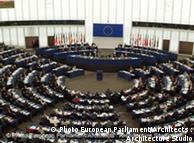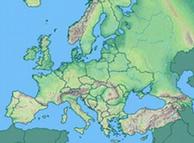from D.WELLE
Intercultural Dialogue | 21.04.2007
"Every Community Needs a Minimum of Common Orientation"
In an interview with Deutsche Welle, Norbert Lammert, the president of Germany's parliament, talks about Turkey and the future of the EU as well as the need for a common leading culture in Europe and Germany.
Deutsche Welle: Mr. Lammert, you have voiced your opposition to a Turkish EU membership on several occasions in the past. Has the brutal murder of three employees of a Christian publishing company in Turkey this week strengthened or confirmed your rejection? Bildunterschrift: Großansicht des Bildes mit der Bildunterschrift: Lammert at DW's headquarters in Bonn
Bildunterschrift: Großansicht des Bildes mit der Bildunterschrift: Lammert at DW's headquarters in Bonn
Norbert Lammert: No. I would also strongly advice against making such superficial connections. There are noteworthy arguments for, but also -- in my opinion -- at least equally noteworthy arguments against full EU membership for Turkey. A significant aspect of Germany's current political situation is that members of the country's two largest parties sit in the same government and have completely opposite views on the matter. Everyone has agreed that the negotiations that have been started with Turkey will be conducted without any preconceived conclusions. That means that everyone involved has agreed that the issue will be decided in light of what will be achieved during the talks.
In previews interviews you have recommended that the EU limit itself -- both in terms of the tasks that it takes on as well as the geographical expansion. Where should the EU end in your opinion? Which countries, apart from Turkey, should definitely not be included, assuming the entire internal reform agenda of the EU had been dealt with and the union's ability to act had been completely restored?![]() There are two basic aspects that don't have anything to do with the concrete case of Turkey to begin with. One of them has to do with the fact, that the EU has avoided and sometimes even repressed the question of outer borders and where they are during the process of development and enlargement that took place during the last five decades. I don't think this question can be avoided much longer in the community's year 50 plus x. That's especially true because every additional member state, no matter which one we want to fight over now, will bring about new membership applications. Because experience has shown that the consistency of a community won't be strengthened as the number of members grows, it's important to resolve this.
There are two basic aspects that don't have anything to do with the concrete case of Turkey to begin with. One of them has to do with the fact, that the EU has avoided and sometimes even repressed the question of outer borders and where they are during the process of development and enlargement that took place during the last five decades. I don't think this question can be avoided much longer in the community's year 50 plus x. That's especially true because every additional member state, no matter which one we want to fight over now, will bring about new membership applications. Because experience has shown that the consistency of a community won't be strengthened as the number of members grows, it's important to resolve this. Bildunterschrift: Großansicht des Bildes mit der Bildunterschrift: European parliamentarians are unwilling to approve expansion without a constitution
Bildunterschrift: Großansicht des Bildes mit der Bildunterschrift: European parliamentarians are unwilling to approve expansion without a constitution
There's a second, equally fundamental issue -- the current state of the union itself. Without a constitution that sets new rules for the kind of cooperation and organization of decision making of the current 27 member states, the community is simply not able to expand -- no matter what country we're talking about. The European Parliament, which -- just like national parliaments -- has to approve further accessions, has already made it perfectly clear that it will not approve further accessions without a constitution. I have no doubt that the same is true for the German parliament.
Let me ask you again: Where are Europe's borders in your opinion, assuming the reform agenda had been dealt with and the constitution had been successfully introduced? Bildunterschrift: Großansicht des Bildes mit der Bildunterschrift: Lammert: Europe has no clear-cut geographical borders
Bildunterschrift: Großansicht des Bildes mit der Bildunterschrift: Lammert: Europe has no clear-cut geographical borders
I'm not so bold as to believe that I am the only one who has a clear and final answer to this question. Objectively speaking, the problem is that Europe has no natural borders, especially when the region that we're talking about is concerned: the eastern European region beyond the newer member states -- Poland, Hungary, the Czech Republic; and definitely not in terms of Turkey. That's why this is a question of political definition, because in this case we cannot base political decisions on geographic borders that serve as obvious criteria.
Could there be cultural borders if there are no geographic borders, as you say? An EU as a common cultural area?
This is indeed my personal preference. But I expressly concede that there are also strong arguments for the opposite view, namely to see the European Community as a bridge into other cultural areas. Both arguments deserve attention and have to be carefully weighed. My reservations about the discussion so far have to do with the fact that this has largely been ignored so far.
 Bildunterschrift: Großansicht des Bildes mit der Bildunterschrift: Can the EU bridge the divide between cultures?
Bildunterschrift: Großansicht des Bildes mit der Bildunterschrift: Can the EU bridge the divide between cultures?
Personally, I am convinced that the internal consistency of a community depends mainly on the cultural identity that such as community does or doesn't have. This is certainly true for nation states and even more so for unions made up of nation states. That's why I fear that an intentional expansion into another cultural area will have grave consequences for the cultural identity, which in turn would have grave consequences for the political consistency of this community.
I want to bring up another concept that you have deal with publicly on several occasions: the concept of a leading culture. Does the European Union need a leading culture and if so, which one would it be?
Undoubtedly -- irrespective of whether one wants to use that term or not. Every community needs a minimum of common orientation and convictions in order to preserve its internal cohesion.
 Bildunterschrift: Großansicht des Bildes mit der Bildunterschrift: Can Europe learn from Rome's ruins?
Bildunterschrift: Großansicht des Bildes mit der Bildunterschrift: Can Europe learn from Rome's ruins?
Apart from that, world history offers an abundance of examples of how this internal consistency was lost as states and empires expanded and how this in turn led to a loss of the ability to act politically within the respective system. I also think that the consensus that this is necessary has grown tremendously over the last few months. There are few people left that deny the need for such a minimum level of common orientation and convictions.
Looking at Germany: What should or what could be a German leading culture? What is it about? Bildunterschrift: Großansicht des Bildes mit der Bildunterschrift: They're not a required part of a German leading culture
Bildunterschrift: Großansicht des Bildes mit der Bildunterschrift: They're not a required part of a German leading culture
I expressly avoid the term German leading culture. Apart from the misunderstandings about the term leading culture as a sign of domination, it also carries the misunderstanding that this is about specifically German, as opposed to non-German, values and orientations.
In fact, there's only one important aspect that's specifically German in connection with the need for a minimum of common values that no society can live without -- the language. Everything else isn't German, but European, western. For this reason, I would advise us not to narrow the point of view in terms of what's needed in Germany. It wouldn't live up to the issues at stake and definitely not to the historic developments.
How should such a leading culture be implemented for all those living in Germany on a practical level? It cannot be introduced by decree and cannot be solved by exclusion -- as in the case of EU accession negotiations. The migrants are already here. Bildunterschrift: Großansicht des Bildes mit der Bildunterschrift: Migrants have to accept western values if they want to live in Germany, Lammert says
Bildunterschrift: Großansicht des Bildes mit der Bildunterschrift: Migrants have to accept western values if they want to live in Germany, Lammert says
Yes, but migration does not have to prevent integration. We've realized for several years now that migration certainly doesn't automatically lead to integration. This already describes the problem and the task we're facing: Anyone who comes to Germany, especially with the expectation to stay here, has to find the binding convictions and orientations acceptable. If he cannot do that because of religious, cultural or other convictions, he will not be able to stay permanently in this specific society.
Is it possible to transfer this common set of values as a leading culture to a common set of values in light of German history? Take questions such as: "Was May 8, 1945 a day of defeat or a day of liberation for Germany?" Or: "What did resistance against the Nazi dictatorship look like and who can be described as belonging to the resistance?" Bildunterschrift: Großansicht des Bildes mit der Bildunterschrift: Lammert swore in Germany's first female chancellor in 2005
Bildunterschrift: Großansicht des Bildes mit der Bildunterschrift: Lammert swore in Germany's first female chancellor in 2005
That's an interesting question, because it can be used to show that the same society can reach different conclusions and convictions over time about certain things. I still remember the controversy provoked by the speech by former German President Richard von Weizsäcker 40 years after World War II. (Editors' note: Weizsäcker called May 8 a "day of liberation" in his speech.) While he gave a prominent platform to a minority view -- as far as I remember -- at the time, it's not become the dominant view within German society as far as I can tell.
Let me touch on a second topic connected with the issue of integration that has a much longer history: gender equality. Today we say that it is an essential part of the common convictions of this society. But a look at our own history makes us realize that this was certainly not always the case.
Felix Steiner interviewed Norbert Lammert (win)

Comments